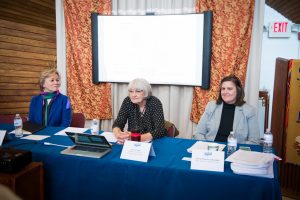March 4th Teach-In: NJ Politics

Since our election last November, millions of Americans (including STAND CNJ’s leaders and members!) have dipped their toes into the unfamiliar waters of activism and civic engagement. Some of us have even jumped completely in! As a result, many of us are realizing there is a lot more to government than we thought. Suddenly, people all over New Jersey are wondering, “Who exactly are my state legislators?”, “What is a freeholder? , and “What do we need to do to pass or defeat a bill in the state legislature?”, among many other questions.
STAND CNJ was proud to host the first of several teach-ins last Saturday, March 4th, to help us begin to answer those questions. Featuring a group of experts in New Jersey politics, the teach-in introduced attendees to the basic structure of New Jersey’s state and local government, discussed ideas for organizing and activism, and reviewed health care in our state.




Ingrid Reed, of the Eagleton Institute of Politics at Rutgers University, mapped out for us the many levels of state government, from the Governor’s office and the State Legislature, all the way down to Town Councils or Committees. Each person in New Jersey is represented by an elected Governor and Lieutenant Governor, one State Senator, two State Assemblymembers, a County Executive, a Board of County Freeholders, a School Board, and a town or city council or committee. Counties and municipalities in New Jersey can choose their form of government, so the size of councils and committees and the process of choosing a mayor will vary from county to county and town to town. Reed also described the structure of the Democratic and Republican parties in New Jersey, and urged us to get involved in our local party district committees (each voting district elects 2 district committee persons, one male and one female, for each of the two parties—and often no one is running for these positions).
Dena Mottola Jaborska, Associate Director at New Jersey Citizen Action, continued Reed’s introduction to state government. Both Jaborska and Reed highlighted the perhaps-too-great power granted to the Governor by our state constitution. In New Jersey, numerous important positions in agencies, boards and commissions are appointed by the Governor, whereas in other states around the country these positions are elected. This means that citizens in New Jersey have fewer representatives to contact, influence, or vote out of office if they are unhappy with the decisions of a commission or agency.
Jaborska’s presentation also highlighted some surprising facts about New Jersey voters. According to Jaborska, the largest category of voter in the state is not Republican or Democrat, but actually “Unaffiliated.” She also cited estimates that 1 million eligible voters in New Jersey are not registered to vote. Furthermore, voter turnout in “off-year” elections (like the one coming up this November) is terribly low—only 38% of voters came to the polls the last time we elected a governor in an “off-year”, compared to 68% turnout for the 2016 presidential election. In years when we are only electing state assembly members, the turnout is even lower!
The experience of Assemblyman Andrew Zwicker, a Democrat from the 16th legislative district, reflects the low level of citizen engagement at the state level. In the election in which he won his seat, Zwicker reported only 22% voter turnout in his district! He won by less than a hundred votes, and is now considered a target for Republicans in the election this fall. According to Zwicker, Democrats historically do not turn out for mid-term elections. This explains the fact that Zwicker is the first Democrat to represent the 16th district, despite the greater numbers of registered Democrats in the district than Republicans. (Zwicker is also the first physicist to serve in the General Assembly!) The information provided by Zwicker and Jaborska reaffirm the importance of getting as many people to the polls this November as possible. In 2017, only New Jersey and Virginia will have elections, and the eyes of the country will be on us.
In addition to learning about how our government works here in New Jersey, Saturday’s panel of experts also highlighted effective strategies for communicating with representatives and organizing our activism. According to Assemblyman Zwicker, the best way to have an impact on your representatives is to meet with them in person to discuss issues of concern. This strategy is largely ignored by constituents, who have made up only about 15% of the people scheduling meetings with Zwicker since he’s been in office. The rest are representatives of special interest groups! If meeting in person with your representative is not possible, Zwicker emphasized the importance of writing a customized, personal letter or email. Apparently, form letters or form emails (like those you can find on the websites of many advocacy organizations) are nowhere near as effective as a unique letter written by YOU!
Jaborska, trained as an advocate and organizer at the Midwest Academy, provided a brief introduction to using the Academy’s well known Strategy Chart. Based on her training, she recommends that every grassroots campaign clearly define its goal, its target (the person you want to influence), its strategy (the general theory of how you can make your goal a reality) and its tactics (specific activities your group will engage in, such as a rally or meeting with representatives).
Besides grassroots campaigns to influence local and state government, teach-in participants also learned about the power of activism that connects you to various other community stakeholders. Becky Taylor, press secretary to former Gov. Christine Todd Whitman and community relations specialist at BTaylor Public Affairs, recommends “win-win” activist strategies that make connections between your grassroots organization and other groups in the community such as non-profits, neighbors, religious organizations, public safety providers, environmental groups, business groups and schools. Her experience creating the Lawrence-Hopewell Trail with a diverse group of representatives from often-conflicting “sides” served as an example of how gathering different people around the same table can improve relations between different community stakeholders, as well as improving the community itself.
As a case study, the teach-in considered the state of health care in New Jersey under the Affordable Care Act, led by Heather Howard of Princeton University. Why should you care about the ACA and the possibility of its repeal, even if your health insurance is not at risk? Howard’s presentation demonstrated the large influence that health care has on the state budget, and its connections to many other areas of life. According to Howard, 30% of the state’s budget goes toward healthcare. The ACA and Medicaid bring $3 billion a year in federal money for the state to cover its health care costs. A complete repeal of ACA would leave a $3 billion-a-year hole in our budget. Since the inception of the ACA, 300,000 New Jerseyans have gained health insurance, and most of those 300,000 have also received federal subsidies to pay for the cost of their insurance. In New Jersey alone, 550,000 people gained coverage thru Medicaid (a program for low-income families).
The effects of repealing the ACA, cutting Medicaid, or instituting Medicaid block grants could have negative effects on the state’s finances, and eventually, on the family budgets of New Jerseyans, Howard warned. Because of the state’s Balanced Budget Amendment, which requires the state to balance its budget every year, there is little flexibility in the state’s finances to deal with unexpected crises such as an economic downturn, a natural disaster like Hurricane Sandy, or a public health crisis like a disease outbreak. If less money is available from the federal government thru Medicaid or the ACA, then the state will have to pay for the costs of such emergencies by cutting funding from other state programs or changing the coverage available for different groups of people, as the state of Arizona had to do in 2010, when it announced it would no longer pay for organ transplants for people on Medicaid. Currently, the state of New Jersey spends a lot of money paying for nursing home care for the elderly. Should this support disappear, many middle-class families could find themselves having to decide between paying for their parents’ nursing home expenses or paying for their children’s college educations.
If you missed the teach-in and would like to watch it, a video of the teach-in presentations is available here. You can watch a video of the Q & A here. Notes taken by participants are also available for download in the Files section of our Facebook secret group.
To find out who your state legislators are, visit click here. To find a map of your legislative district, check out this. To find a map of your Congressional district, check out this. Don’t miss our next STAND CNJ education event on March 31st, “How to Talk to Your Legislators Effectively.”
